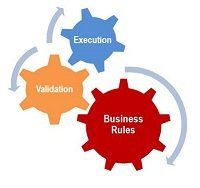A business rules engine (BRE) is a software system that allows organizations to define, manage, and execute business rules in a centralized and consistent manner. These rules, also known as "policies," define how a business operates and can include anything from pricing strategies to compliance regulations.
BREs are typically used to automate decision-making processes, enabling organizations to make quick and accurate decisions based on pre-defined rules. This can improve efficiency and reduce the risk of human error. Additionally, BREs can also be used to enforce compliance with industry regulations, reducing the risk of penalties and legal action.
One of the key advantages of using a BRE is that it allows organizations to separate the logic of their business operations from the underlying systems that support them. This makes it easier to change or update the rules as needed without affecting the underlying systems. This also allows for more flexibility in the event of changes in regulations or business strategies.
BREs can be used in a variety of industries, including finance, healthcare, insurance, and retail. For example, in the insurance industry, a BRE can be used to automate the underwriting process, making it possible to quickly and accurately assess the risk of insuring a particular individual or business. In the retail industry, a BRE can be used to set prices based on a variety of factors, such as supply and demand or competitor pricing.
The implementation of a BRE typically involves the following steps:
1. Identifying the business rules that need to be managed and automated
2. Defining these rules in a clear and consistent manner
3. Implementing the BRE in the organization's systems and processes
4. Testing the BRE to ensure it is functioning as expected
5. Monitoring and maintaining the BRE to ensure it continues to meet the organization's needs.
FlowWright has 2 kinds of BRE’s, graphical decisioning, where you can drag and drop within the process designer and define rules to be evaluated. The other, is decision tables, where for complex decisioning, a decision table can be designed with any number of inputs, outputs and decisions. Once defined, the decision table can be utilized within a workflow process.
In conclusion, a business rules engine is a software system that allows organizations to define, manage, and execute business rules in a centralized and consistent manner. It enables organizations to make quick and accurate decisions based on pre-defined rules, improves efficiency, and reduces the risk of human error. It also allows for more flexibility in the event of changes in regulations or business strategies, and can be used in a variety of industries. The implementation of a BRE typically involves identifying, defining, implementing, testing, and maintaining the rules.







